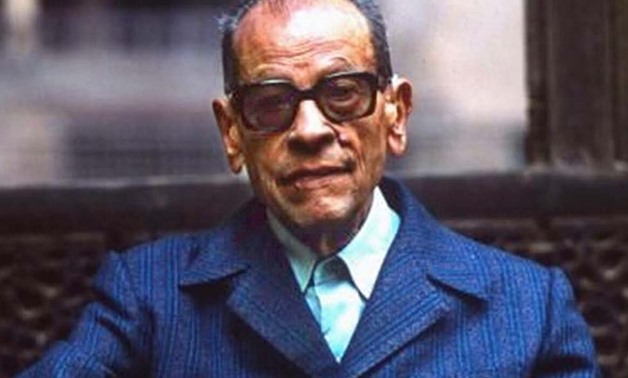
FILE: Naguib Mahfouz (1911-2006)
CAIRO - 11 December 2019: Dec. 11 marks the birthday of the legendary late writer Naguib Mahfouz.
Author of 34 novels, over 350 short stories, five plays and dozens of movie scripts, Mahfouz was, by all means, the most disciplined writer ever. He wrote for one hour daily throughout his 70-year career, smoked three cigarettes per day and walked by the Nile every morning.
He met weekly with the new generation of writers, artists, and readers through an informal seminar, which is a habit he developed in the 1950s.

At the age of 82, Mahfouz was stabbed in the neck in 1994 by an extremist in an assassination attempt following a huge wave of hatred after the fatwah (Religious statement) issued by Ayat Allah Khomeini of Iran against Arab/English author Salman Rushdi over his famous book “Satanic Verses”.
The controversy came from his design of the character Gebleway a wealthy landowner and a harsh father who is negligent to his descendants, leaving them in poverty and misery, and appointing the dark son Adham to run the business instead of Idris the eldest son.
The novel relays the story of Adam and Satan, then the quarrel between Satan and God, and later mentions the story of Kane and Abel where he kills his brother and the grandfather refuses to interfere.
The stories of the prophets of the main religions, Moses, Jesus and Mohamed, continue. He changes the names brilliantly with clear hints to which religious personality he is handling in each new chapter.
He avoids the miracles and humanizes the struggles in efforts to make the story about fighting for the rights of the poor who are all sons of Gebelawi and have equal rights to wealth.
Mahfouz was blunt in expressing his ideas; he discussed politics, history, and philosophy in his novels. He covered a lot of subjects such as socialism, homosexuality, and God. Mahfouz's novels were informative and showed the development of Egypt in the 20th century.
Mahfouz’s first novel was “Khufu’s Wisdom”. He wrote 35 novels afterward and 15 collections of short stories alongside with “Echoes of an Autobiography” in 1994, according to an article by AUC Press.
The iconic writer didn’t only write novels and short stories, but also took the initiative to work on 25 film screenplays that featured specific writing techniques such as flashbacks. Egyptian cinema has created over 30 Egyptian films that were based on Mahfouz’s novels and literary works.
He also wrote weekly columns in state-owned newspapers Al-Ahram and Al-Ahram Weekly in 1971, including "Naguib Mahfouz at Sidi Gaber: Reflections of a Nobel Laureate 1994- 2001."
Mahfouz was honored by the government; he received the Egyptian State Prize twice for his writings.
Promoting great collections of Arabic narratives locally and internationally, Mahfouz received other countless awards including one from the American University in Cairo and an honorary doctorate in 1995. Also, he was chosen as an honorary member of the American Academy of Arts and Institute of Arts.
Following his death, Mahfouz’s works further resonated in the Egyptian literary scene. AUC Press became his main English language publisher and agent of all translation rights. The agreement was signed with Mahfouz prior to his death.
A total of 50 newly discovered short stories written by the Egyptian Noble Laureate Mahfouz, were published on December 11, 2018.
The newly discovered short stories were found by the late writer's daughter, Um Kulthum Naguib Mahfouz, and culture journalist Mohamed Shoair.
The short stories collection was published by Lebanese publishing house Dar Al-Saqi under the title “Hams El-Nogoom” (Whispering of the Stars). Dar Al-Saqi announced it acquired the rights to publish Mahfouz’s short stories from his daughter.

Comments
Leave a Comment